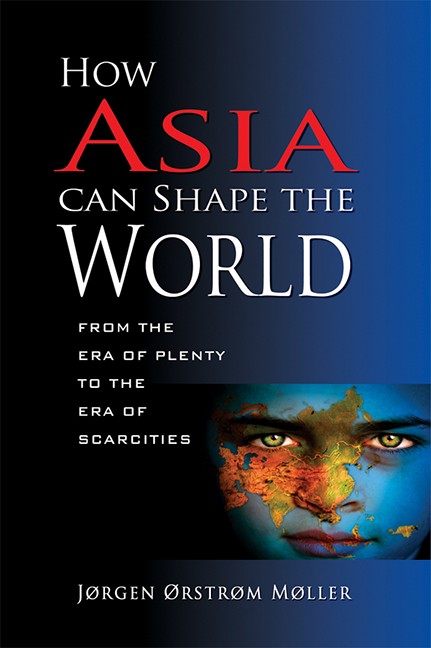1 - THE FUTURE WORLDVIEW
Published online by Cambridge University Press: 21 October 2015
Summary
The dominating world view since 1750 is coming to an end. It was based upon science, industrialization, logic, rationality in philosophy, the nation state, availability of resources, and the free market model. Their interaction formed a coherent and well-functioning model. With strong growth and rising populations Asia will encounter the problems flowing from the end of the model sooner and harder than other regions. Risks or volatilities surges may happen as a result. Ancient religions and philosophies anchored in a world view of harmony between man and nature may help Asia to discover a different and new growth model reflecting scarcities of resources, mutual respect and harmony, and the need for ecological growth. The trend for objectivity as a valid, yes, undisputed, basis for arguments to give to subjectivity (rationality giving way to values) may enhance the move towards such a new world view.
Asia must transform itself from sleeping partner in economic globalization and also one of the main beneficiaries with little or no influence on decision making (and little or no wish to wield such influence), into the main beneficiary and the main playmaker of globalization. Leadership is in essence the political will to forego national or domestic benefits in order to shoulder burdens to uphold the system. To step into that role a nation or group of nations or Asia must have a clear and unequivocal concept — a grand design — of the system it wants to unfold. That will help to enrol Africa, Latin America, and the Middle East in globalization, thus keeping the fundamental skeleton of globalization intact while at the same time switching it from a Western-controlled vehicle to a genuine global one.
The encouraging and promising perspective is that it can be done. It depends fundamentally on Asia and Asians whether it will be done. To succeed Asia and the Asians must “read” the Zeitgeist and turn an epistemological recognition into practical and effective policies.
The scenario can be compared to what happened 250 years ago.
THE OUTGOING WORLD VIEW
In the middle of the eighteenth century the prevailing world view started to crack. New technology using power (energy) made it cheaper and easier to extract raw materials. New agricultural methods opened the door for higher productivity.
- Type
- Chapter
- Information
- How Asia Can Shape the WorldFrom the Era of Plenty to the Era of Scarcities, pp. 1 - 104Publisher: ISEAS–Yusof Ishak InstitutePrint publication year: 2010



